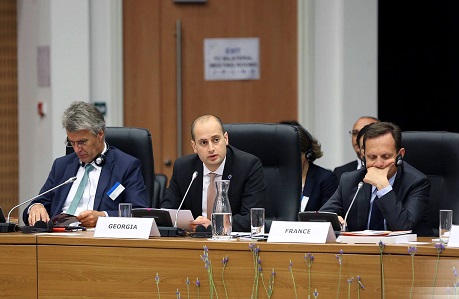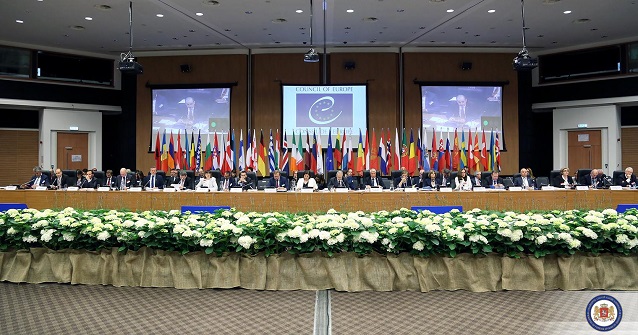Foreign Minister: Georgia deserves promotion to CoE’s post-monitoring phase

Georgian Foreign Minister Mikheil Janelidze says that Georgia has greatly improved its democracy and the country deserves to be upgraded from the Council of Europe (CoE) Parliamentary Assembly’s monitoring stage to the post-monitoring phase.
Janelidze talked about Georgia’s recent democratic achievements as he spoke at the 27th meeting of the CoE Committee of Ministers in Nicosia, Cyprus today.
"Ensuring media freedom, strengthening the judiciary, respect for human rights – these are the top priorities for Georgia. We are happy to announce that Georgia has made consistent ad decisive steps towards all of these directions”, Janelidze said.

Mikheil Janelidze talked about Georgia’s recent democratic achievements at the 27th meeting of the CoE Committee of Ministers in Nicosia, Cyprus today. Photo: MFA of Georgia
He added European and Euro-Atlantic integration agenda is a map or Georgia which leads the country to democracy, security, peace and higher standards of wellbeing.
"Taking the fundamental transformation of Georgia into account, we strongly believe that it is important for Georgia to be upgraded from the monitoring stage to the post-monitoring level”, Janelidze said.
"This would be a well-deserved progress for my country and also a stimulus to keep on democratic reforms”.
The Parliamentary Assembly's monitoring helps the CoE member states fulfill their promises to uphold the highest democratic and human rights standards. The procedure works in four ways.
- Full monitoring procedure: This involves regular visits by a pair of rapporteurs, who conduct an ongoing dialogue with authorities, and occasional plenary debates to ensure that a state's progress and problems are honestly assessed. This currently applies to ten states (Albania, Armenia, Azerbaijan, Bosnia and Herzegovina, Georgia, Republic of Moldova, Russian Federation, Serbia, Turkey and Ukraine).
- Post-monitoring dialogue: States that have made progress may pass on to this stage, a less intensive procedure involving a limited number of remaining issues. This currently applies to three states (Bulgaria, Montenegro and "The former Yugoslav Republic of Macedonia").
- Periodic reviews: All other member states are subject to this process roughly every five to six years, which draws together information from all parts of the Council of Europe to arrive at an overall assessment of how far they are honouring their obligations and commitments to the organisation. This currently applies to 33 of the Council's 47 member states.
- Specific report on the Functioning of Democratic Institutions: Finally, the committee can prepare a report on the functioning of democratic institutions in any member state when particular developments warrant.
 Tweet
Tweet  Share
Share